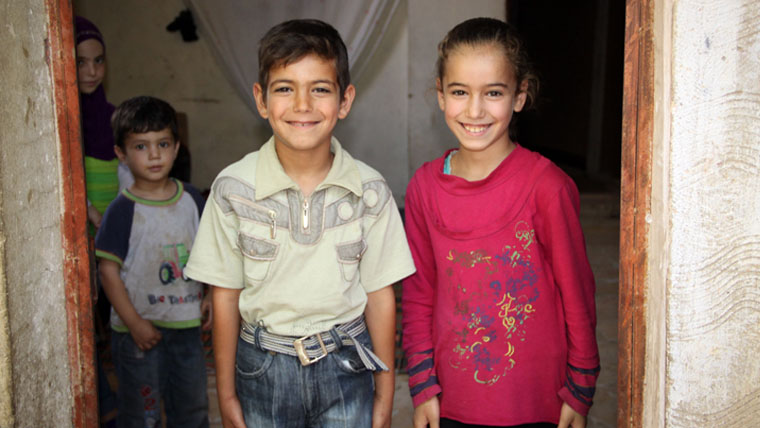Without education, Syria’s children and future are at risk

By Joy Toose, Social Media Manager, World Vision Australia
When I ask children living in Lebanese refugee settlements what life is like in Lebanon compared to life in Syria, I expect complaints. Instead, I hear statements of relief, of gratitude.
“We don’t hear the missiles and gunfire anymore, we were very frightened there,” eight-year-old Falak tells me.
“We feel safe here,” adds her twin brother Abdullah.
While many of the children struggle to remember life in Syria before the fighting, when they do, they talk passionately about the things they miss.
I’ve heard kids reminisce about fun things, like riding their bikes and playing football, as well as things I take for granted, like regular showers and proper meals. But, the one answer that I hear again and again from older children about what they miss is school.
They miss their schools, their friends and their teachers.
The situation is so dire for Syria’s refugees that it’s easy to overlook the importance of education. Some of these children have already been here for two years, and at least for now, there is no indication as to when they might be able to return.
A generation on pause
I worry that without education these children will be a forgotten generation. They are simply surviving, waiting out the war. Their whole life is paused, except that they are still getting older. Some of them will be adults before this conflict is over.
Of everything I’ve seen and heard over the past month, the thought of these children and their future is what worries me most. I think about it before I go to sleep, when I wake-up and in the car trips to and from the refugee settlements where we work.
I see Mahamed and Ahmed whose gentle seriousness makes them seem older than they are. I see the friendly, hopeful Falak and Abdullah, and so many others with uncertain futures.
Yesterday, a mother named Safaa echoed my thoughts with a passionate plea. “I don’t care about where we live or what we eat,” she said. “I want school for my children.”
She knows it’s not just about today, but about the future.
Without education how will the children who’ve experienced so much violence and lost so many things have a chance at a normal life? How will they have the tools to express their experiences, and the choices and opportunities to enable them to move on as adults?
Most importantly, without education how equipped will these children be to build a future where their children feel safe, where they don’t fear the sounds of gunfire and missiles?
Why there’s reason for hope
World Vision’s work in education here in Lebanon’s Bekaa Valley is exciting – it has the potential to make such a huge difference for children and impact the future of Syria.
The program is called an accelerated learning program. It works with children for three months to get them to a point where they can enrol in a local Lebanese school.
With some help, these children have a chance at an education and the opportunities that come with it.
It was a pleasure to visit the small demountable classrooms where sessions in Arabic, English and math were being taught. The children in the English class greeted us, and shared all the words that start with the letter “a” they had been learning. I felt hopeful and grateful.
I still worry though. As thousands of refugees leave Syria every day I wonder where continued funding will come from to support the program especially when just the basics of water, shelter and food are so urgently needed.
And, if we can’t help these children to go to school – what happens to Ahmad, Mahamed, Falak, Abdullah and the hundreds of thousands of others?
As Safaa said to me, “this is the next generation, if they are not educated, how will anything change?”
Thanks to Joy for sharing her experiences and her hopes for the future of Syria's children. What do you pray most fervently for? Tell us on our Facebook page.